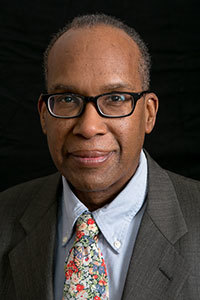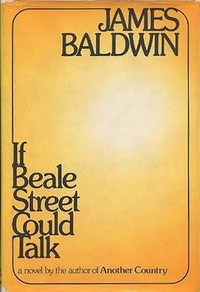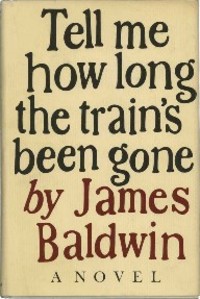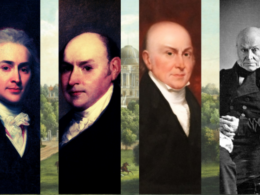
The Library of America completed its James Baldwin edition in Fall 2015 with the publication of James Baldwin: Later Novels, which collects three titles from the late 1960s and the 1970s: Tell Me How Long the Train’s Been Gone, If Beale Street Could Talk, and Just Above My Head. In the following interview, the book’s editor, Darryl Pinckney, explains why all three novels are ripe for reconsideration by general readers and critics alike.
Darryl Pinckney is the author of the novel High Cotton; the critical study Out There: Mavericks of Black Literature; and, most recently, Blackballed: The Black Vote and US Democracy. His new novel, Black Deutschland, will be released in February 2016. He is a frequent contributor to The New York Review of Books, among other publications.
LOA: Apart from what these three novels reveal about Baldwin’s imaginative concerns at this stage of his life and career, what would you say—to a reader who may be coming to them for the first time—about the sheer novelistic pleasures of these books?
Pinckney: Baldwin was a committed realist as a novelist, though If Beale Street Could Talk and Just Above My Head show that he decided he was as free as anyone in the 1970s when it came to the uses of the first-person and the rules about point of view, as laid down by Henry James and Percy Lubbock. A concrete sense of place informs his realism, even in novels that can be far-flung in their geographical reach. His novels have become portraits of an urban America—in particular, a New York City—that is beginning to be a while ago. Some fiction acquires, over time, interest as history.
Baldwin wrote novels of ideas and, as interior as they are in the way his characters develop, his long fictions are discussion novels. Baldwin’s people are desperate to connect. Talk is their medium; understanding is what they have to offer; it may matter more than the heart. In a late Baldwin novel, the story moves by revelation, confession, by dialogue. Much depends on his ear, on what he gives his characters to say and how they say it. These novels coincide with Baldwin’s writings for the theater and film. They have some of that atmosphere, making his realism not a documentary, naturalistic kind, but something theatrical, even flamboyant. We say that Baldwin grew up in Harlem, but he also grew up performing. Leo Proudhammer, an actor, the narrator of Tell Me How Long the Train’s Been Gone, is very aware of the similarities between the pulpit and the stage.

LOA: In a letter to his brother David, Baldwin called If Beale Street Could Talk “the strangest novel I’ve ever written.” Any thoughts as to what might have prompted that admission?
Pinckney: Go Tell It on the Mountain and Another Country are written in the omniscient voice, but Baldwin’s other novels have first-person narrators. He asks his storytellers to do a lot, chiefly describing what they have not seen, while seducing us into not minding this at all, because it is Baldwin’s personality as a writer that holds the drama of his language.
Tish, in If Beale Street Could Talk, is Baldwin’s only woman narrator and perhaps that’s what he meant when he wrote to his brother that it was the strangest novel he’d ever written. Tish is nineteen and pregnant when the novel opens, fighting to free her baby’s father from jail. The cruelties of the justice system are a theme or concern in much of Baldwin’s fiction, but If Beale Street Could Talk is not a work of memory—in the sense that we feel that Baldwin’s scenes of confrontation between white cops and black youth in Harlem in, say, Tell Me How Long the Train’s Been Gone are rooted either in experience or his own youthful observations. It is, more directly than his others, a problem novel, the illustration of an argument.
LOA: At the center of Just Above My Head is a gay couple, Arthur and Jimmy, who basically see themselves as married. You have publicly reconsidered your initial charge, in 1979, that Baldwin’s depiction of these two was sentimental; meanwhile, the Library of America’s reissue of the novel came three months after the Supreme Court ruled that the Constitution guarantees a right to same-sex marriage. Comment?
Pinckney: The masculine as an ideal is made manifest in Go Tell It on the Mountain, Giovanni’s Room, and Another Country. Baldwin seems to be saying, when the human touch is coming from the right person, coming from an individual’s honesty about his loves and desires, then it, the human connection, has healing powers. His early novels concern youth and Baldwin himself was not yet forty years old by the time Another Country became a bestseller in 1961. Go Tell It on the Mountain is about loss of innocence, but its protagonist has possibilities, a future. At the conclusion of Giovanni’s Room David is a changed man, maybe a damaged one, but he has survived. Eric, the white American bisexual, is the triumphant figure in Another Country, free and not neurotic. In each novel, the journey is finally a solitary one.
Tell Me How Long the Train’s Been Gone ends ambiguously, as does If Beale Street Could Talk. But in each, the protagonist is last seen with family of some kind, real or imagined. The hero of Just Above My Head is already dead, but his brother who tells his story still weeps for his loss at the end. Baldwin’s novels appear to divide between the years of sexual hunt and the years of settling down. When Just Above My Head was published, in 1979, Baldwin’s portrayal of gay characters reconciled to the family, loved by the family, did not accord with the atmosphere of sexual freedom. Back in the time of pre-AIDS hedonism, young men were more interested in asserting their freedom to cruise openly. Approval of family, society, not required.

In Tell Me How Long the Train’s Been Gone, Leo Proudhammer categorizes the word gay as an instance of incomprehensible vernacular, a reflection of Baldwin’s distance by temperament more than by generational experience from what was thought of as gay liberation. He addressed the subject directly in only two essays and was interested in the sexuality of men, male desire, not homosexuality. It was another limitation to be resisted, yet another example of the insufficiency of language to describe the complexity of human experience.
But the novels also expose his bias for butch guys. No matter how much self-respect one of Baldwin’s main characters may derive from having been willing, as a small black boy, to stand his ground and get beaten up on the streets of Harlem, Baldwin’s novels belong to the big brother figure, the sexualized protector. Meanwhile, Giovanni’s Room is downright mean to older gay men and effeminate men. That novel is not particularly nice to women either, his one novel in which his sensitivity to the history of women is not in evidence. In his other longer fictions, male sexuality is inclusive, fluid, and in that Baldwin was going against the times that said okay, we accept you, but you have to stay over there. You have to be either one thing or the other, straight or gay. By the time of Just Above My Head, he lets Arthur cry in Crunch’s arms.
LOA: Can you place Baldwin in the social and political context of the period when these books were written? Why do you think they have received less, and less favorable, attention than the early work?
Pinckney: The first thing to look at when describing the context of these late novels are the essays and articles he was writing at the same time, when he allowed himself the broadest strokes of his despair and disillusionment. He went on trying to challenge people, wake people up, provoke them, even during the Carter years, but a political and cultural backlash was underway. Then, too, his late novels feature explicit sexual scenes, interracial, same-sex, and otherwise. His novels are not about comfortable subjects. His black characters are not ordinary people. They are too free of the rules. Even Fonny, the unjustly incarcerated youth in If Beale Street Could Talk, is a sculptor, with a loft on Canal Street. Go Tell It on the Mountain is written with an almost anxious discipline and control; Giovanni’s Room and Another Country are filled with lyricism. By comparison, Tell Me How Long the Train’s Been Gone, If Beale Street Could Talk, and Just Above My Head offer the heroic voice. They are works of resistance, much more openly composed when expressing the hostility of his characters to the social order.
Nothing in Baldwin’s fiction is as bitter as his long essay “No Name in the Street.” And yet a feeling that Baldwin’s late fiction is somehow unsuccessfully political hangs over those works that aren’t political in the conventional sense at all. Baldwin’s black characters tend to be articulate, sometimes they can be as eloquent as James Baldwin, and given their lives, how could their lives not be critiques of race in America? His novels take it as given that American society is violent. But the reputation of the late nonfiction was applied to the fiction as well. And so the next feeling was that we had heard it before. As far back as the summer of 1968, mere months after Martin Luther King’s assassination, Norman Mailer said he was tired of black people “and their rights.” It was as though many whites in his audience said they had had enough of hearing about problems they no longer had the will to solve. They preferred fantasies of resolution, of roots found, the past appeased. Moreover, the end of Baldwin’s life saw the rise of the black neo-conservative, the figure assigned to undermine the civil rights legacy in American intellectual life. Baldwin stood his ground and paid a price.
LOA: The depiction of a black family’s struggle with the criminal justice system in If Beale Street Could Talk suggests how much has not changed in the forty-one years since the book was published. How does Baldwin’s handling of this material strike you, in 2015?
Pinckney: There is a weird contradiction in If Beale Street Could Talk, having to do with how penetrating is Baldwin’s portrayal of the white cop’s resentment at being restrained in public and unable to exert his power over Fonny and his frustration as a crucial plot device, his framing Fonny for rape, intimidating witnesses. On the one hand we have this insight into the psychology of the white policeman, and then on the other a device based on this psychology that belongs to its period as well as to its genre. Baldwin’s novel is among those works of fiction that looked for ways to talk about conspiracies against black people on the part of law enforcement as an everyday possibility.

LOA: One adjective that recurs in the original, often negative reviews of Just Above My Head—which follows two families over a span of thirty years and across several continents—is “sprawling.” This is a charge that might be, but isn’t, leveled at similarly expansive, discursive books by writers like Jonathan Franzen and Richard Powers. (We’re thinking particularly of Powers’s The Time of Our Singing, another family saga that grapples with music and race.) Thoughts on this?
Pinckney: Criticisms of form, of lack of control, are sometimes a way of not liking what a book has to say overall or of being opposed to novels of ideas. We don’t complain about long novels in translation, but we are suspicious of our own long novels about the United States, because the longer it is, the more it might contain or examine.
Writers’ reputations often decline posthumously. Less often, a writer’s reputation comes back up. Baldwin’s certainly has, and new audiences don’t read him with that borderline in his career in mind, that demarcation between early and late Baldwin. Writers are much more of a piece in retrospect anyway. His nonfiction is admired because of his refusal to compromise, and his fiction has admirers because of what he was willing to try to express.
LOA: The new LOA edition annotates these novels for the first time, and the end notes spell out a remarkable number of musical allusions—in blues, gospel, and pop and show tunes. Is Baldwin’s engagement with such a range of music somehow integral to these books’ meanings?
Pinckney: The Library of America staff is to be congratulated on the success of the Notes to this volume, which can only add to our appreciation of what may have been in Baldwin’s head as he wrote, our sense of the musicality of his exposition, the blues tones in some moments of his dialogue. When these novels were first published, we could not see them in view of his biography. Now we can, and we see how much of his own experience he put into them.



